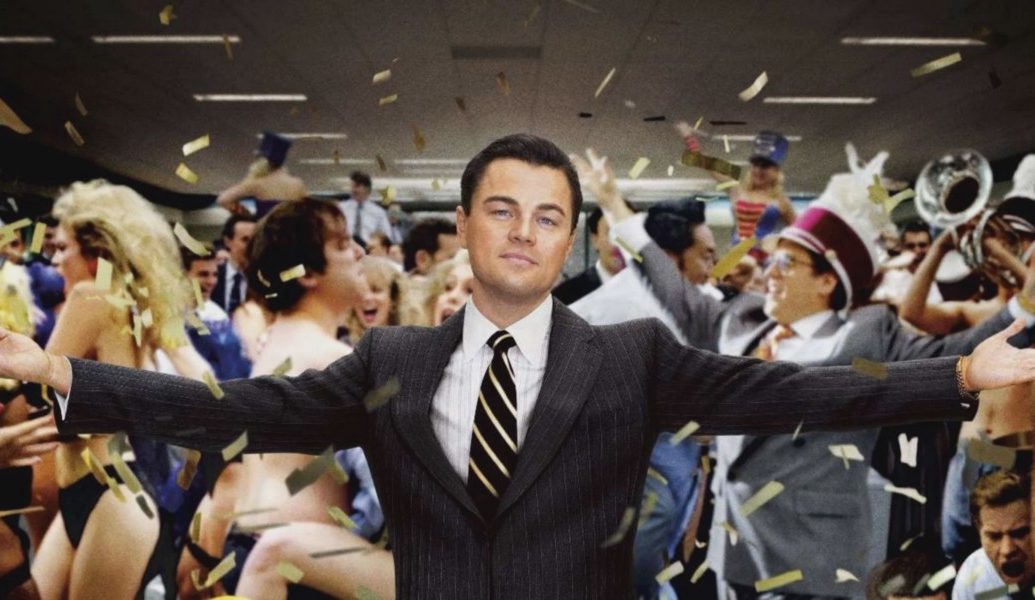Before watching this movie, I had my doubts. Three whole hours? Three hours spent on a film about a Wall Street broker sounded like a recipe for boredom. I pictured endless paperwork, phone calls, flickering green-and-red stock charts, sly tricks, and drawn-out dialogues meant to showcase the lead character’s cunning. And that lead? None other than Leonardo DiCaprio—the youthful, lovesick Jack from Titanic, or the brooding, pragmatic yet still smitten Gatsby from The Great Gatsby.
“The Wolf of Wall Street is worth those three hours”—that’s roughly my takeaway after finishing it. In today’s hectic world, carving out that much time for a movie without explosive battles, million-dollar effects, or swoon-worthy romance between picture-perfect leads isn’t easy. Writing this review, I realized I needed to be raw, honest, and unfiltered, just like the film itself. It’s the least I can do to honor the director, the actors, and the gritty reality they brought to life.
A Predator’s Rise
The story centers on Jordan Belfort, a young guy obsessed with stocks and the brokerage game, living off commissions—or, put simply, “eating” the fees he earns pushing shares. I can’t think of a better word than “eating” here; it fits.
His first day on Wall Street, like any rookie broker, brimmed with dreams of wealth rivaling a star on the Walk of Fame. Under the wing of his first boss, Mark Hanna, Belfort transforms into a true artist of money-making. Hanna, already a master of the game, molds him into the wolf he’ll become, planting the seeds of survival in this cutthroat world: “Their money’s better in our pockets. Oh, and do drugs and jerk off twice a day if you want to make it on Wall Street.”
Let me be clear: Belfort’s life is a roadmap to ruin—real, unvarnished ruin. Every milestone matters, so I won’t dress it up in fancy words. If it sounds crude to you, well, it is.
Armed with Hanna’s crash course, Belfort dives into the money chase, thinking life’s finally turning up. Then the market crashes, and as he puts it, “Wall Street swallowed me whole and spat me out.” The stench of filth runs through the film—not literal, but reeking in every sales pitch Belfort and his crew sling over the phone. By day, they’re “honest” workers; by night, they’re peddling drugs.
Charisma and Chaos
Belfort has a gift: he can whip people into a frenzy—over money, over debauchery. Along the way, he proves another life rule: “Rich? New friends. Fancy? New wife.” He falls for a young, gorgeous woman and ditches his first wife, the one who stuck by him through the lean early years in New York. Loving a hot young thing? Easy. Dumping the woman who weathered the storm with you? Apparently, just as easy. Belfort loves money and anything tangible—crisp, rustling cash and a flashy, willing wife trump an “outdated” one. To a broker like him, loyalty’s just another game. High as a kite, he calls his drug runner his “best buddy.”
Belfort embodies a truth: the deeper the depravity, the sweeter the thrill. No surprise, then, that this “petty king” builds a loyal crew and a swelling client base. His voice, his gestures, his stare—they hit the teenage psyche dead-on, tapping into a strain of American culture back then: reckless freedom, rebellion, and a middle finger to restraint.
The wolf knows his prey and feeds them flawlessly. All-night parties—at the office, no less—turn into orgies of drugs, hookers, and excess. They revel, rake in cash, and revel some more. To keep the cycle spinning, Belfort preaches money like a gospel, modeling a life lived for it. No fluff: it’s houses, cars, wives, trips, status. Follow him, and you’ll have cash—piles of it—to slake the lust he stokes, no questions asked.
The Empire of Excess
His company, Stratton Oakmont, balloons. More staff means more suckers out there eager to get rich quick, pouring cash into what’s essentially BELFORT AND FRIENDS’ PARTY FUND. After slaving away all day, those investors drift off to sleep, smugly dreaming their money’s growing. Meanwhile, Belfort and his posse blow it on women, drugs, and cackling about their clients’ loyal stupidity.
If FBI agent Patrick Denham hadn’t shown up—his presence growing toward the end—Belfort might’ve died of boredom, stumped on how to burn through mansions, supercars, beauties, yachts, drugs, and stacks of cash that fill rooms. Once the feds catch wind, he scrambles to stash his fortune in Switzerland—then maybe England, too, since Switzerland feels too small for his haul. He could’ve dodged the heat by turning himself in, but you can’t cage a wolf in a zoo. It thrives on instinct—and dies by it.
The Fall
When his shot at redemption passes, the curtain falls with a court summons. His young, stunning wife bolts with their kid at the whiff of a 20-year sentence. That child will grow up fatherless, hearing lousy tales about Belfort. At trial, only his parents show, their faces etched with guilt for not steering him right sooner. Lucky for him, cooperation shaves his time down to 36 months.
The film’s based on a true story, drawn from Belfort’s memoir, The Wolf of Wall Street.
Why Spill the Ending?
I laid out the ending here, no cliffhanger, because I want you to think, not just wonder about watching it. Seeing it or skipping it matters less than wrestling with it. Misread the message, and it’s easy to get lost. Living full-throttle in youth isn’t wrong, but burning out without a thought for those around you means it all crashes when you hit life’s far side.
Post-prison, Belfort tried turning it around. In a speech, he reflected: “I was greedy… Greed’s no good. Ambition and passion? That’s great. Passion builds prosperity. My goal now is to give more than I take—that’s success that lasts…”















